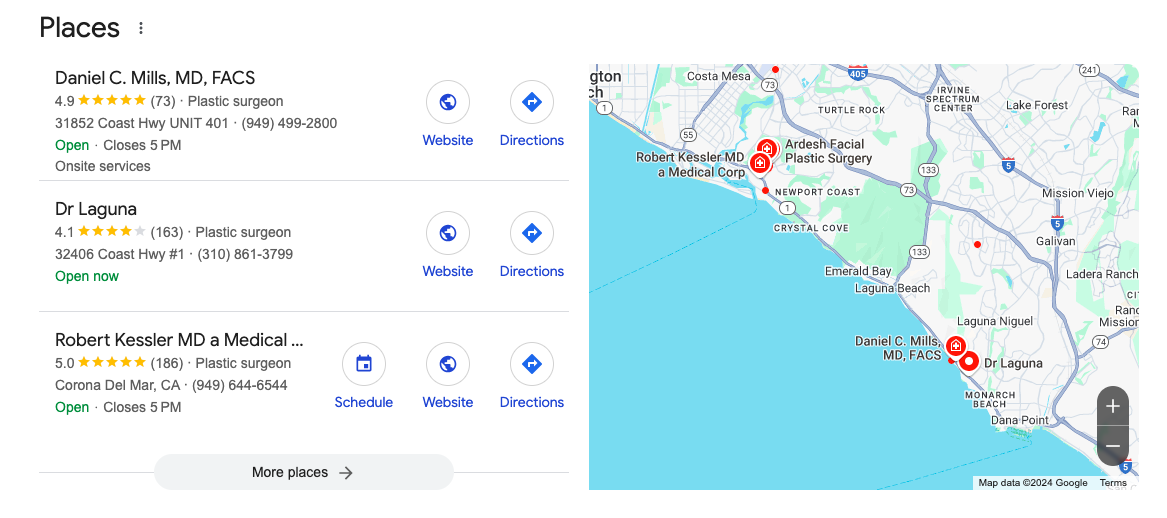Local SEO for Plastic Surgeons: A Guide to Ranking Higher in Search

Understanding the Local SEO Landscape for Plastic Surgeons
Before diving into tactics, it’s essential to grasp why local SEO is different from traditional SEO. While general SEO is about reaching broad audiences, local SEO targets prospective patients in your geographic area, typically those ready to book consultations. Google’s Local Pack—those top 3 map results—drives high-converting traffic. For plastic surgeons, where trust and proximity are paramount, ranking in the Local Pack is gold.
Think of Local SEO as the digital version of your office signage—except it reaches patients before they even leave their homes.
When you utilize Google to search for a service in your general area, you’ve likely seen a section called “Places” instantly appear at or near the top of the first results page that contains the names of three businesses or organizations. Otherwise known as the “Local Pack,” these listings appear side-by-side with a Google map. Placement in the Local Pack can make your practice remarkably visible, and there are things you can do to improve the likelihood of inclusion in that distinct and prominent group.
In addition to our guide on SEO for plastic surgeons, which goes right along with enhancing local SEO strategies, here are some tips on best practices that may just help you become the leader of the Local Pack:

GBP (Google Business Profile) Optimization
Creating a Google Business Profile is one of the most important things you can do to increase the chances of entry into the Local Pack. Once you click on one of the top three businesses in the Local Pack, the GBP should pop up on the righthand side. The GBP offers an array of helpful details about the practice. Make sure your GBP is optimized carefully and precisely because accurate information is key. Ensure that the URL for your website, as well as the name of your practice, address, and phone number, are all correctly listed on all of your online platforms. Also, the services your practice offers should be clearly listed and placed in relevant categories. Finally, it is often a good idea to enhance your GBP with high-quality video and/or images of yourself, your practice, and your team.
Most practices claim their Google Business Profile (GBP), but few optimize it fully. Go beyond the basics:
- Service Categories: Add subcategories for specific procedures (e.g., “Facelift Surgeon,” “Breast Augmentation”).
- Procedure Descriptions: Use all available characters to describe your services clearly and keyword-rich.
- Q&A Section: Seed the FAQ with real patient questions and answers.
- Appointment Links: Integrate booking tools or link to your consultation page.
- Photo Strategy: Add before-and-after photos labeled with EXIF data (e.g., “San Diego Facelift Before-After.jpg”).
Maintain Consistency with Your Name, Address, and Phone Number (NAP)
This goes along with consistently ensuring accuracy of information in your Google Business Profile. Your NAP (Name, Address, and Phone number) should always be updated and correct basically everywhere you appear online, including your plastic surgery website, online directories, and social media pages. If your name, address, and phone number are not the same from one online platform to the other, Google may get confused and your ranking may be negatively affected as a result.
Mobile Search Optimization
Since many (if not most) people conduct local searches on their mobile phones these days, it’s very important to have a website that is designed to load quickly and to be easily viewed in full on mobile devices. This makes it a more pleasant experience for the person searching for local services and may ultimately aid your entrance into the Local Pack.
Maintain Patient Reviews
Google Maps takes positive reviews into account. Patient reviews can boost online reputation management and they can be a major factor for placement in the Local Pack. By encouraging satisfied patients to write reviews about your practice and by quickly responding to them, you can clearly emphasize your dedication to providing your patients with the best possible experience. Google reviews are a ranking factor and trust signal. Quantity, frequency, and keyword usage within reviews matter.
Strategies:
- Respond to all reviews within 24–48 hours to show responsiveness and improve engagement.
- Use post-op follow-ups to request reviews.
- Direct satisfied patients to your GBP using QR codes in-office.
- Don’t review-gate—Google frowns on it.
Integration of Local Keywords in Your SEO Strategy
Your overall SEO strategy should be leveraged to enhance visibility in the Local Pack by incorporating geo-targeted keywords—such as “plastic surgery in San Diego” or “San Diego plastic surgeon”—across your main website pages and blog content. Don’t stop at just your city; include nearby neighborhoods or suburbs patients might search from to widen your local reach. Key strategies include creating city + procedure pages like “Rhinoplasty in La Jolla” or “Breast Lift in Del Mar,” optimizing doctor bios with local affiliations and references, and applying LocalBusiness schema markup on every service location page. For example, a well-structured page for “Tummy Tuck in La Jolla” could feature a patient testimonial, a brief case study, and directions from recognizable local landmarks.
Localized Blogging & News Content
Too many plastic surgeons miss the chance to blog about hyperlocal topics. Instead of “Benefits of a Facelift,” try:
- “What La Jolla Patients Should Know Before Getting a Facelift”
- “Top Plastic Surgery Trends in San Diego – 2025 Edition”
- “How Coastal Weather Affects Skin Treatments”
Also include press releases about awards, media mentions, or new hires, with location-specific headlines and schema.
Integration of Local Backlinks
Links from other websites that direct the viewer to pages on your own website are called backlinks. These can be very helpful, especially when they come from directories, organizations, and websites that are local to your area. This can help Google determine that your business is trusted in the community.
A strong backlink profile remains a top ranking factor.
Tactics:
- Partner with local wellness influencers or med spas for reciprocal blog posts.
- Submit articles or op-eds to local lifestyle magazines.
- Sponsor community events and request backlinks on event sites.
Think of backlinks as digital referrals. The more respected locals vouch for you, the better Google trusts your site.
Technical SEO & Core Web Vitals for Local Ranking
A fast-loading, plastic surgery mobile-friendly website impacts local rankings.
- Compress images, especially on procedure galleries.
- Implement lazy loading for videos and heavy content.
- Ensure your location pages are indexable and not buried in navigation.
- Set up breadcrumb navigation and internal links between related services and locations.
Run your site through PageSpeed Insights and address mobile performance issues—it can mean the difference between ranking #3 and falling off the pack.
Social Media Engagement
Social media engagement is a big contributing factor for local SEO strategies. It doesn’t have a direct effect on entrance into the Local Pack, but it can certainly have an indirect one by enhancing local SEO efforts and keeping your target audience engaged. Maintain a strong plastic surgery social media presence by regularly updating your platforms, remaining in touch with your followers, and providing links to your website on your social media channels.
Take Advantage of Google Posts
It’s a good idea to regularly update Google Posts, which is a nice feature of Google Business Profiles that helps keep them active. Google Posts can include quick updates about new offers and events from your practice, as well as information about top products, any recent honors or recognitions, and general announcements. In addition to text, Google Posts can include photos and videos.
Tracking Local SEO Success: Metrics That Matter
Google Analytics and Search Console help, but also track:
- GBP Insights: phone calls, directions requests, photo views.
- Keyword rankings for “procedure + city” terms.
- Conversion rates on local pages.
- Review growth velocity.
Set KPIs for local leads and compare month-over-month. Tools like BrightLocal or Whitespark can help visualize local rankings.
Future Trends: AI & Local Search for Plastic Surgery
With Google leaning into AI-generated summaries and featured answers, expect more zero-click searches. To stay visible:
- Use structured data aggressively.
- Answer local questions in blog posts and GBP Q&A.
- Monitor changes in the Local Pack (e.g., the addition of Services buttons, menus, or AI cards).
Early adopters of AI-driven SEO and Google’s evolving display features will have the edge—especially when others sleep on it.
Conclusion
Local SEO isn’t a set-it-and-forget-it task—it’s a living extension of your practice’s reputation. For plastic surgeons in competitive markets, dominating the Local Pack means more qualified leads, booked consults, and brand trust that can’t be bought with ads alone.
Would you like to find out how you can increase your chances of inclusion in the Local Pack? Please contact Rosemont Media today and one of our consultants will be happy to talk with you about custom strategies designed to help your practice stand out in a crowded online field.